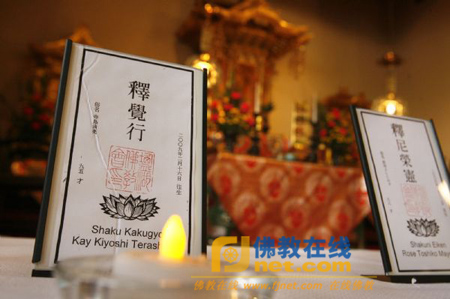美国犹他州盐湖寺举行盂兰盆法会 纪念逝去佛教徒

据海外媒体报道,2009年7月11日,美国犹他州净土真宗派盐湖寺在盂兰盆节之际举办活动,纪念那些逝去的佛教徒。
据悉,该寺为每一位亡者都设置了灵位,并用鲜花装饰佛坛,燃香供奉。
7月12日,盐湖寺还举行了佛事活动。除了诵经外,所有活动语言皆为英文。参加活动的大部分人为日籍美国人,也有一部分非亚洲人。参加活动的Ernie Kayed表示,在美国新增佛教徒中,非亚洲人所占比例最大。
据悉,佛教于1912年传到犹他,尊重所有宗教信仰并持戒修行。现在犹他州已有大约10个佛教宗派,佛教已经成为该州人民生活的一部分。(编译:子规)
For almost 100 years, Buddhism has been a part of Utah life. And on Saturday, the Salt Lake Buddhist Temple commemorated followers who have gone before with its annual Oban festival.
The temple, a Jodo Shinshu sect that is affiliated with the Buddhist Churches of America, displayed a small plaque for each member who had died in the past year. Flowers decorated the altar and incense was burned as an offering.
The festival also included a Taiko drum performance, dancing and food.
The teachings of the sect, whose main temple is in Japan, are designed to help practitioners achieve enlightenment, according to Brenda Koga, who gave tours of the temple, 211 W. 100 South, which also is called Japantown Street. The Four Noble Truths center on the existence and causes of suffering, she said, and the Eightfold Path describes a way to end.
"I call it a guideline for living," Koga said.
Services, which are held on Sunday, are in English except for the chanting, which is a way to prepare the mind for meditation. Most members of the congregation are Japanese-American, but non-Asians also are part of the congregation.
One of them is Ernie Kayed, who is Koga's brother-in-law. He said non-Asians make up the biggest part of Buddhism's growth in the United States.
Kayed said Buddhism is respectful of all religions and considers the Golden Rule fundamental to its practice. Buddhism came to Utah in 1912 and there are about 10 different sects in the state, he said
欢迎投稿:307187592@qq.com news@fjdh.com
QQ:437786417 307187592 在线投稿
2.佛教导航欢迎广大读者踊跃投稿,佛教导航将优先发布高质量的稿件,如果有必要,在不破坏关键事实和中心思想的前提下,佛教导航将会对原始稿件做适当润色和修饰,并主动联系作者确认修改稿后,才会正式发布。如果作者希望披露自己的联系方式和个人简单背景资料,佛教导航会尽量满足您的需求;
3.文章来源注明“佛教导航”的文章,为本站编辑组原创文章,其版权归佛教导航所有。欢迎非营利性电子刊物、网站转载,但须清楚注明来源“佛教导航”或作者“佛教导航”。



